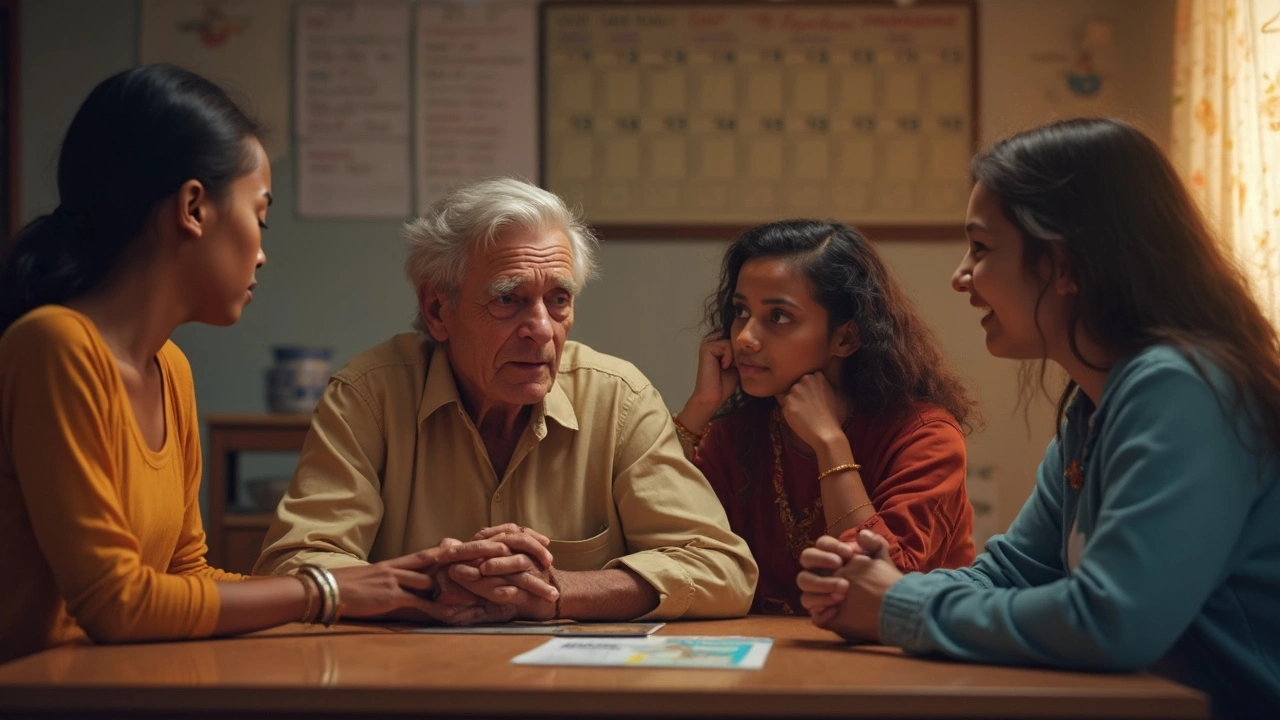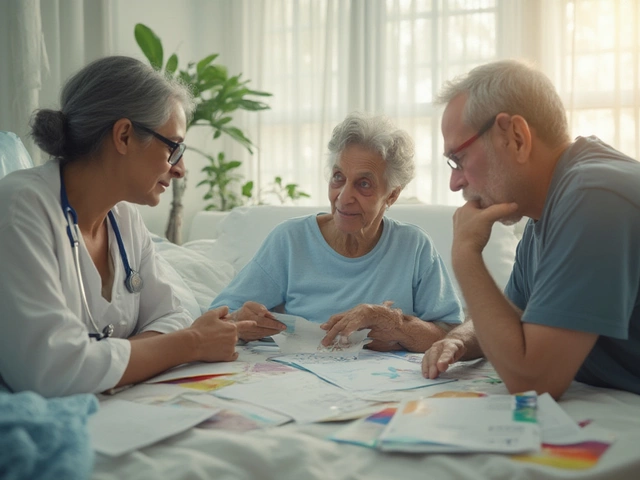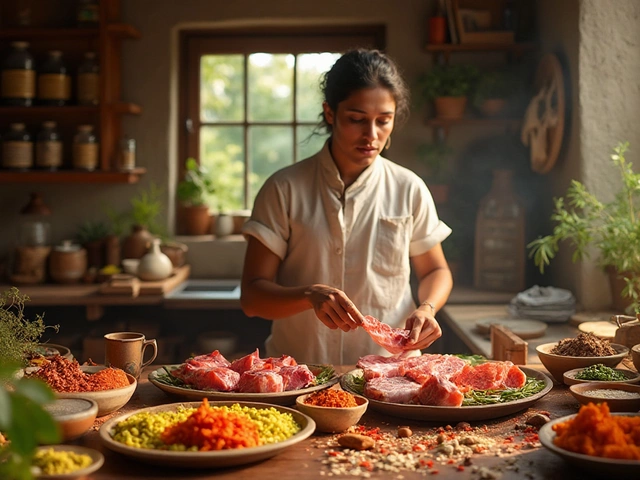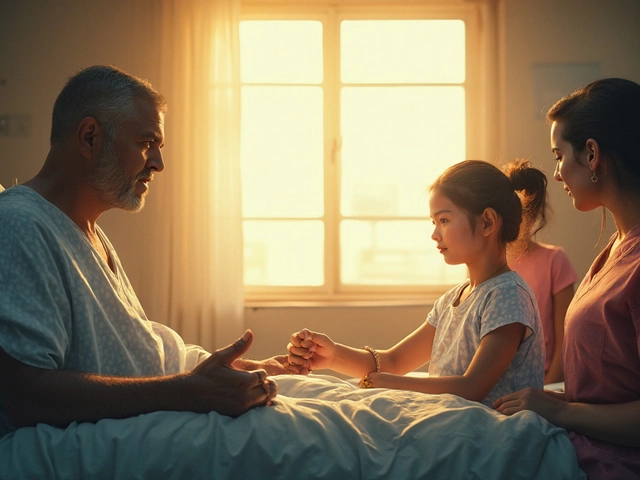Mention "cancer," and most folks get uneasy. Say "pancreatic cancer," and you’ll see real fear. It has a reputation for being a silent killer—most patients don’t even know they have it until it’s already spreading. Why so much dread? For starters, it’s nasty at hiding. You can feel totally normal until one day nothing feels right. By then, doctors usually find it has grown or spread, which is why survival numbers are much lower than with more common cancers like breast or prostate.
If you’re reading because you’re worried about pancreatic cancer, you’re not alone. It’s something I think about too, especially when talking health with my kids, Vihaan and Arya. There’s a good reason people fear it, but there’s also a lot you can do—knowing the facts is step one. The rest comes down to catching problems early, understanding your risks, and following the latest in treatment breakthroughs. So if you’re after real info—no sugar-coating, just straight talk—let’s get into it.
- Why Pancreatic Cancer Scares Everyone
- Symptoms Few People Notice
- Survival Stats—And Why They Lag
- Breakthroughs and New Hopes
- Practical Ways to Cut Your Risk
Why Pancreatic Cancer Scares Everyone
When it comes to pancreatic cancer, even doctors look worried. One huge reason is that this cancer barely makes a fuss until it’s advanced. The early stages usually don’t come with obvious symptoms—no clear warning signs like lumps, easy bleeding, or big changes you can spot early. By the time you realize something’s up, it’s often late in the game, and that’s what makes it so intimidating.
But it’s not just the stealth. It spreads fast. Pancreatic tumors can invade surrounding organs like the liver or lungs before you ever know they’re there. This is why surgeons sometimes can’t remove it when they finally find it. In medical speak, over half of all pancreatic cancer cases are diagnosed only after the cancer has already spread beyond the pancreas.
Here’s a number that hits hard: the five-year survival rate in most countries still hovers around 11%. Compare that to breast cancer or prostate cancer, where survival rates can go above 90%. That’s a massive gap. When you look at it as a parent, like I do with my kids, that stat is downright terrifying.
| Type of Cancer | Five-Year Survival Rate |
|---|---|
| Pancreatic | ~11% |
| Breast | 90%+ |
| Prostate | 95%+ |
Another thing about pancreatic cancer: it doesn’t care who you are. It’s hit famous folks like Steve Jobs and Alex Trebek, but plenty of ordinary people and families have had to face it out of the blue. There are no surefire ways to spot it early—there’s no simple screening blood test like the ones used for other cancers.
The combo of late detection, fast spread, and scary numbers is what really drives the fear home. People want to know there’s hope, a clear warning sign or test, but right now, it’s mostly about staying alert, knowing your risks, and not ignoring vague health changes.
Symptoms Few People Notice
The real headache with pancreatic cancer is that the symptoms often slip under the radar. People usually blame them on something harmless, so the cancer keeps growing quietly. By the time it’s obvious, treatment options shrink.
So what are these tricky signs? They’re not dramatic, but they matter. Watch out for:
- Sudden weight loss that doesn’t make sense. If you’re eating your normal meals but the pounds are dropping off, that’s a red flag.
- Loss of appetite or feeling full quickly. One day, your regular lunch suddenly feels like too much and you can’t finish half your plate.
- Yellowing eyes or skin (jaundice). If you or someone you know starts to look yellowish, don’t wait—get it checked. Pancreatic cancer messes with bile flow, so this can pop up even if nothing else feels off.
- Belly pain or back pain. Some people mistake this for muscle strain or indigestion. But with pancreatic cancer, the pain can be steady or get worse after meals.
- Itchy skin. This seems random, but it actually ties back to bile buildup in your bloodstream.
- New or sudden diabetes. People who never struggled with blood sugar might get diagnosed with diabetes out of nowhere. That’s because the pancreas controls insulin.
Here’s a look at how common some of these warning signs really are when people get diagnosed:
| Symptom | Percent Noticing |
|---|---|
| Weight loss | Almost 60% |
| Loss of appetite | Around 50% |
| Jaundice | About 47% |
| Belly or back pain | Roughly 40% |
Notice that none of these are headline-grabbers like coughing up blood or finding a lump. That’s why pancreatic cancer gets missed so often. My dad, in his late 50s, thought his mild back pain was from bad posture—nobody connected it to anything serious at first. That’s typical for many families.
If you spot a combo of these symptoms that just doesn’t fit your normal health pattern—especially if you’re over 50, smoke, or have a family history—push for answers. It might be nothing, but you never want to bet against your gut.
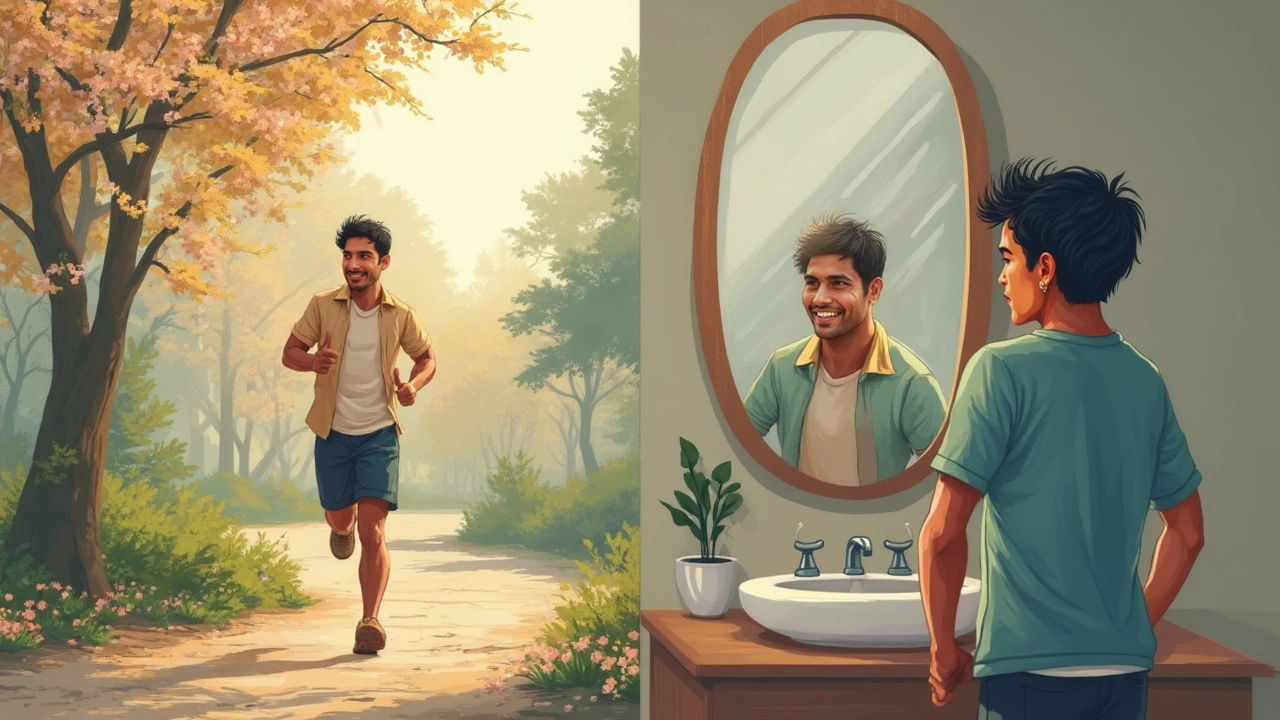
Survival Stats—And Why They Lag
If you talk to anyone who's dealt with pancreatic cancer, the numbers are tough to swallow. In the U.S., the five-year survival rate for pancreatic cancer hovers around 13%. Compare that to prostate or breast cancer, where those rates can top 90%, and you see why this one gets the “most feared” label.
Why are survival rates so low? Most cases aren’t caught early enough for surgery, which is still the best shot at a cure. Only about 1 out of 5 people are diagnosed when the cancer is still in one spot. The rest already have cancer cells on the move. Once it spreads outside the pancreas, those survival odds drop fast.
| Cancer Type | 5-Year Survival Rate (%) |
|---|---|
| Pancreatic | 13 |
| Breast | 91 |
| Prostate | 97 |
| Colon | 65 |
Those stats can hit like a punch in the gut. But it’s not just about medical treatment—timing matters more for pancreatic cancer than most other cancers. Its early symptoms are usually sneaky: back pain, tummy troubles, or weird weight loss. A lot of people chalk it up to aging or stress. By the time someone pushes for scans or tests, the cancer has gotten a big head start.
There’s another reason the stats stay low: not all treatments work for every patient. Chemo and radiation help, but this cancer’s cells are stubborn and tricky to target. Plus, even if you get surgery, it’s a tough road with a long recovery.
The good news? Survival rates are inching up—just a decade ago, they were in single digits. Thanks to better scans and some new drug combos, people are living longer, even with advanced pancreatic cancer. But these figures show why scientists and doctors are so fired up to find better ways to catch it early and fight it harder.
Breakthroughs and New Hopes
When you hear about pancreatic cancer, it’s easy to feel like there’s no good news. But that's changing. In the last few years, research teams all over the world have started to break some ground. No magic cure yet, but folks are living longer and getting better results thanks to new treatments.
One major shift is in how doctors now target the cancer. Not everyone gets the same treatment anymore. Before, everyone got a similar “one-size-fits-all” chemo. Now it’s getting personal—doctors check the tumor’s genetics first. Some people have specific DNA changes (like BRCA mutations—the same ones linked to some breast cancers), and they can get special meds called PARP inhibitors. These drugs attack cancer’s weaknesses in ways regular chemo doesn’t.
Immunotherapy is another big player, even if it’s not a home run yet for pancreatic cancer. Scientists are testing lots of ways to wake up the immune system so it can hit back harder. Some trials show promise, especially for people whose tumors have certain features. There are new treatments in clinical trials, like combining immunotherapy with radiation or chemo, to see if they work better together.
What’s really hopeful is that people are joining clinical studies faster than before. That means more real answers, and quicker. There are even vaccines being studied—not to prevent, but to help the immune system spot and kill cancer cells if you already have the disease.
Here’s a snapshot of how things are looking with the latest treatments:
| Treatment Type | What’s New? | Who Might Benefit? |
|---|---|---|
| Targeted Therapy | PARP inhibitors for BRCA mutations | 10-15% of patients |
| Immunotherapy | Combo treatments in clinical trials | Selected patients with specific tumor markers |
| New Surgery Techniques | Less invasive, faster recovery | Earlier stage patients |
If you or someone you love is battling pancreatic cancer, it’s worth asking about genetic testing and clinical trials. Even if you aren’t in a big city, telemedicine is making it easier to join studies or talk to experts. The big idea? New hope isn’t just for the future—it’s starting to show up right now. People are living longer, and treatments keep getting smarter. As I keep telling Vihaan and Arya, new science can turn the toughest odds around—bit by bit, we’re getting there.
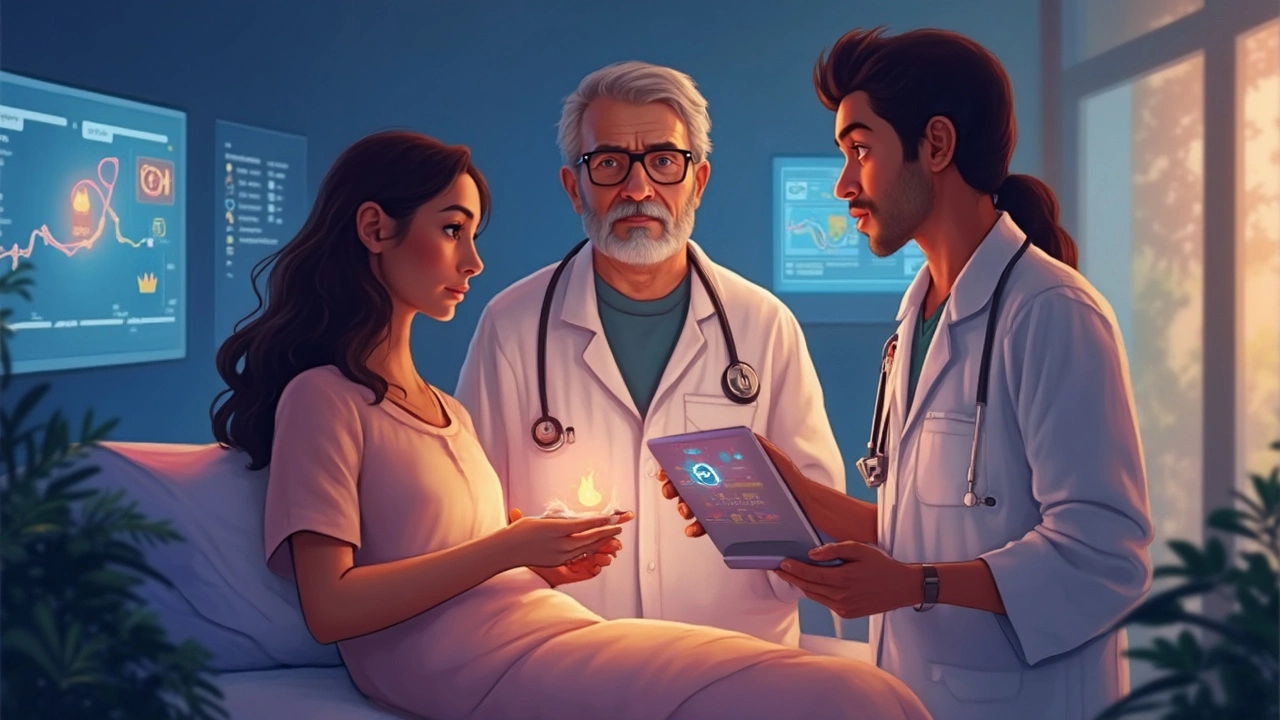
Practical Ways to Cut Your Risk
If you're worried about pancreatic cancer, there’s good news: some habits really do help lower your odds. It’s not magic, but simple tweaks to daily routines can make a difference—even for those with a family history. Here are straight-up moves that experts agree on.
- Don’t smoke. Smoking is a big trigger for pancreatic cancer. If you quit, your risk drops almost to the level of someone who never smoked after a decade.
- Watch your weight. Carrying extra weight, especially in your belly, bumps up your risk. Healthy eating and staying active both help.
- Stay active. Regular exercise (even thirty minutes a day) keeps your body working right. You don’t need fancy gear—a brisk walk, a jog, or chasing your kids around the park counts.
- Mind your sugars. Diabetes can raise your risk, especially if you develop it suddenly after age 50. Keep your blood sugar in check by cutting back on sodas, ultra-processed snacks, and sweets.
- Eat smart. Diets high in red and processed meats have been linked to a higher risk. Aiming for more veggies, fruit, and whole grains is the straight path here.
If you’re wondering if genes play a part—yes, family history matters. Around 10% of pancreatic cancer cases are tied to genetics. If someone in your close family had it, talking to a genetic counselor about testing isn’t a bad idea.
| Risk Factor | Can You Control? |
|---|---|
| Smoking | Yes |
| Obesity | Yes |
| Physical Inactivity | Yes |
| Heavy alcohol use | Yes |
| Family History | No |
I get it—life gets busy, and it’s not always doable to do everything “right.” But even knocking smoke out of your life or walking a little more every day shifts the odds in your favor. If something feels off or you notice odd stomach pain that won’t quit, don’t brush it aside. Early checkups have saved lives, and the sooner you act, the better the game plan if you ever need one.
